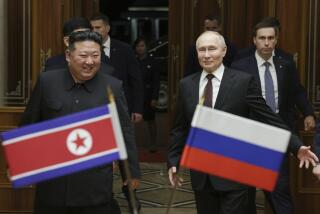‘Unofficial Visit’ Includes Pledge of Patience, Peking Duck and a Tour
- Share via
BEIJING — With a long bear hug for his hosts, North Korean leader Kim Jong Il boarded his private rail car for the trip home after pledging to be patient and flexible in six-party talks aimed at stemming Pyongyang’s nuclear weapons program.
Shortly after the train left, China’s state media ended their news blackout with images of Kim engaging in lengthy embraces of Chinese President Hu Jintao, Premier Wen Jiabao and former President Jiang Zemin, head of China’s military.
In a sign of the growing distance between the allies, Kim wore a gray Mao-style shirt for a meeting with Hu while the president opted for a gray Western suit and red tie.
North Korea “will continue to take a patient and flexible manner and actively participate in the six-party talks process,” Kim told Hu, according to the official New China News Agency, “and make its own contribution to the progress of the talks.”
During his secrecy-shrouded trip, Kim also visited the model farm of Hancunhe outside Beijing, ate Peking duck at Beijing’s famous Quanjude restaurant near Tiananmen Square and went to the city of Tianjin, about 75 miles south of the Chinese capital. There were reports that he also planned to stop in China’s Rust Belt in the northeast, an area whose economic conditions mirrored those in North Korea.
During the three days of talks, said Jia Qingguo, associate dean at Beijing University’s School of International Studies, China was expected to, among other things, advise North Korea to tone down its rhetoric and respond flexibly if Washington shows any willingness to compromise.
Vice President Dick Cheney probably was urged to do the same during his visit last week, Jia added, amid Chinese hopes of finding a way to bridge the divide between the two adversaries. “It’s in the two countries’ interest to make a compromise,” Jia said. “The problem is the level of accumulated hostility and suspicion.”
The New China News Agency said the “unofficial visit” was made at Hu’s invitation, adding that the two leaders “exchanged in-depth views on peacefully solving the nuclear issue on the Korean peninsula.” China hopes to play host to a third round of six-party talks involving the two Koreas, the United States, China, Russia and Japan before July. The last round ended in February with little progress.
Analysts said part of the reclusive North Korean leader’s motivation for making the trip was to see China, which provides important lessons and a window on the outside world. The two countries had similar political and economic systems before China embraced market reforms, which give Pyongyang an example of what is possible.
Despite the contrast between China’s economic prowess and North Korea’s famine-driven problems, they have a similar objective: ensuring that the Communist Party maintains its monopoly grip on political power.
Even after the veil of secrecy surrounding Kim’s trip was officially lifted, the Hancunhe model village declined to give details of his visit. “There were some activities going on, but I don’t know what they were,” said a woman who identified herself only as Li.
According to its website, Hancunhe was once a destitute village that has been transformed into a magnet for visitors from around the world. Hancunhe’s 2,700 villagers enjoy an average annual income of more than $900, nearly twice the national average. They work in the construction industry and at a local heating-system factory and grow organic vegetables.
Those running the Quanjude Peking duck restaurant were similarly mum. “I have nothing to tell you,” said an employee, who declined to give his name.
Internet discussion groups were far less reticent about the visit. “Why is it an ‘unofficial’ informal visit. If he comes, it’s official, formal,” one of several anonymous postings on Sina. com said about the trip. “Why does it all have to be so mysterious,” another said.
Several criticized Kim’s motives for making the trip, typified by one that said: “He’s only coming to ask for more money.” A few of the approximately 40 messages posted on the site Wednesday viewed North Korea positively, including comments such as “China and North Korea are good comrades,” and “North Korea is our hard-line friend.”
But most were negative, with comments about his hair, dictatorial ways and isolation, including a suggestion that he study in China for a couple of years to catch up with the times.
“Playing cards with North Korea is not a good idea,” one said. “You could be gambling with your life.”
More to Read
Sign up for Essential California
The most important California stories and recommendations in your inbox every morning.
You may occasionally receive promotional content from the Los Angeles Times.










